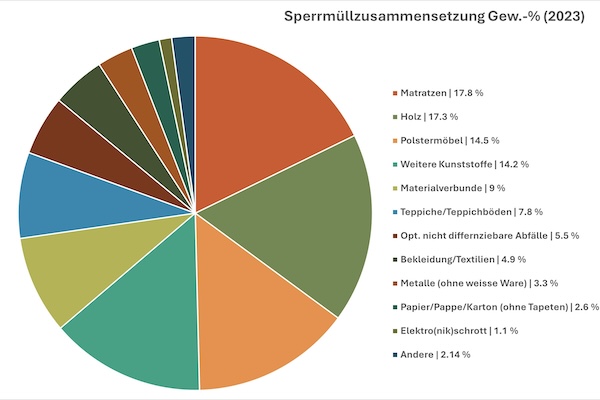 Pie Chart showing the Composition of Luxembourg’s Bulky Waste;
Credit: Luxembourg’s Environmental Agency
Pie Chart showing the Composition of Luxembourg’s Bulky Waste;
Credit: Luxembourg’s Environmental Agency
On Friday 18 April 2025, Luxembourg’s Environmental Agency announced that the amount of bulky waste generated in the country is decreasing.
Bulky waste is household waste that is too large to be collected in the same containers as other household waste. Residents are therefore asked not to include bags or boxes of mixed municipal household waste in bulky waste. These materials must be recycled properly, with due regard for the environmental impact.
The results of a recent analysis, conducted by the agency, confirmed that between 2020 and 2023, the amount of bulky waste generated by Luxembourg residents decreased by 3,700 tonnes (equal to 7 kg per inhabitant). According to the agency, this development reflected the efforts made in terms of waste management and increased public awareness. However, the analysis highlighted that 1,292 tonnes (11% by weight) of the items collected could still be reused and that 82% by weight consists of materials that could be separately collected and recycled.
Analysis results
Nearly two thirds of the bulky waste analysed (63.77% by weight) was made up of mattresses, wood, plastic and furniture. A significant proportion of bulky waste (82% by weight) contained materials that could be recycled, such as wood, paper, plastic and electronic waste. The agency emphasised that these materials should not be handed in for bulky waste collection and should be properly sorted to improve recycling and encourage more responsible waste management.
The majority of the 1,292 tonnes of items handed in for collection were furniture and toys in good condition. These items could be repaired or redistributed rather than being thrown away. 21% of items left for door-to-door collections were in this category, compared to 9% for collections brought to resource centres.
There was a temporary spike in bulky waste following the floods that the country experienced in 2021, especially in municipalities within the SIGRE network (Syndicat Intercommunal pour la gestion des déchets ménagers, encombrants et assimilés en provenance des communes de la région de Grevenmacher, Remich et Echternach).
The analysis highlighted the progress Luxembourg has made in reducing and recycling bulky waste. However, it also underscored the ongoing need for public awareness and practical, sustainable solutions to further improve waste management.
Tips for reducing bulky waste
Preventive initiatives such as buying second-hand items, repairing items or buying quality furniture is reported to play a key role in reducing waste. By encouraging responsible consumption, these practices not only help to limit waste, but also extend the life of products, thereby reducing the pressure on natural resources and waste management systems. The agency also noted that certain types of waste have specific treatment processes. Recyclable materials collected separately at resource centres as well as electrical and electronic waste require special treatment and are therefore not considered bulky waste.
A few suggestions
- Buy less: before each purchase, consider whether it is truly necessary and choose durable products that do not need to be replaced frequently;
- Repair, donate or sell: before discarding furniture or other bulky goods, see if they can be repaired;
- Consider re-use by giving the item to someone else, donating it to a charity or selling it on a second-hand platform. This helps extend the life of objects and reduces waste.








